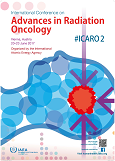Speaker
Meredith Giuliani
(Radiation Medicine Program, Princess Margaret Cancer Centre, Toronto, Canada; Department of Radiation Oncology, University of Toronto, Toronto, Canada)
Description
Background:
With the rapidly growing number of cancer patients globally, addressing gaps in cancer care services is now an acute need. Radiotherapy is critical to the management of cancer patients. However, the majority of patients in low-income countries do not have access to radiotherapy. The gap in radiotherapy access around the world is huge and there is a need for >200,000 new health professionals by 2035 to meet the demand for radiotherapy services (Lancet Oncol, Sept 2015). We considered the challenges and gaps in health professional training using current training models and the opportunities to address this health human resource shortfall through innovative educational methods, models and technology.
Methods:
To address the current and growing gaps in available health professionals we have an obligation to explore innovations in all aspects of education and re-imagine curricula from the current “industrial model” into a “systems-based” (Frenk, Lancet, 2010) approach using a competency-based foundation. Traditional professional boundaries and scopes of practice must be challenged and new scopes of practice defined. New training models should leverage local skills and leadership while promoting global credentialing and practice standards. These models will promote local talent retention and expansion.
Results:
The authors propose to explore and pilot new educational models to address three main areas for innovation: 1) professional scopes of practice and task shifting; 2) a systems-based competency model for curriculum development and 3) maximized use of educational technology in a blended curriculum.
Professional scopes of practice are evolving in multiple jurisdictions; e.g.; introduction of a Clinical Specialist Radiation Therapist (CSRT) program in Ontario, Canada, the incorporation of Physician Assistants into cancer in the United States, and the development and integration of automation technologies. The scope of practice for radiation medicine professionals must be reviewed in each local/regional context and task shifting or re-distribution of roles and responsibilities accomplished to maximize the use of scarce resources. Efficiency models may be used to simulate the optimal distribution of tasks among professionals and automated technologies. The principles of such new models should be to maximize high quality and safe radiotherapy delivery while maximizing resources and access to treatment.
A systems-based core curricula grounded in competency-based principles should be developed to address the all aspects of the radiation treatment process for the new professional scopes of practice. This new curriculum should articulate the new professional roles in a care environment which is capitalizing on the use of automation technologies. This curricula should encompass global standards for cancer care while allowing for local and regional contextualization, customization and challenging the status quo. Innovative curricular models must be leveraged through excellent clinical teachers and rigorously tested and evaluated through educational research. The merits of global certifications, facilitating a portable radiation medicine workforce, in the local context should be explored. A train-the-trainer knowledge translation plan should be simultaneously developed with the curriculum to promote rapid expansion of human resources for cancer care by leveraging local expertise.
Blended learning approaches are likely to maximize learning and the sharing of educational resources as global public goods. Blended learning is the combination of on-line or digital learning with face-to-face learning. To facilitate this a review of potential barriers to end-users of on-line/digital content in local environments is needed as well as proposed strategies to mitigate these barriers. The on-line/digital content requires a sustainability strategy and should be developed as global public goods without cost for use.
Conclusions: The educational innovations outlined in this paper require local feasibility assessment and a systematic resource development plan to address expanding global shortages in health professionals and to address training disparities around the globe.
| Institution | Radiation Medicine Program, Princess Margaret Cancer Centre, Toronto, Canada; Department of Radiation Oncology, University of Toronto, Toronto, Canada |
|---|---|
| Country | Canada |
Author
Meredith Giuliani
(Radiation Medicine Program, Princess Margaret Cancer Centre, Toronto, Canada; Department of Radiation Oncology, University of Toronto, Toronto, Canada)
Co-authors
David Jaffray
(Radiation Medicine Program, Princess Margaret Cancer Centre, Toronto, Canada; Department of Radiation Oncology, University of Toronto, Toronto, Canada)
Mary Gospodarowicz
(Radiation Medicine Program, Princess Margaret Cancer Centre, Toronto, Canada; Department of Radiation Oncology, University of Toronto, Toronto, Canada)
Tracey Liu
(Radiation Medicine Program, Princess Margaret Cancer Centre, Toronto, Canada)

